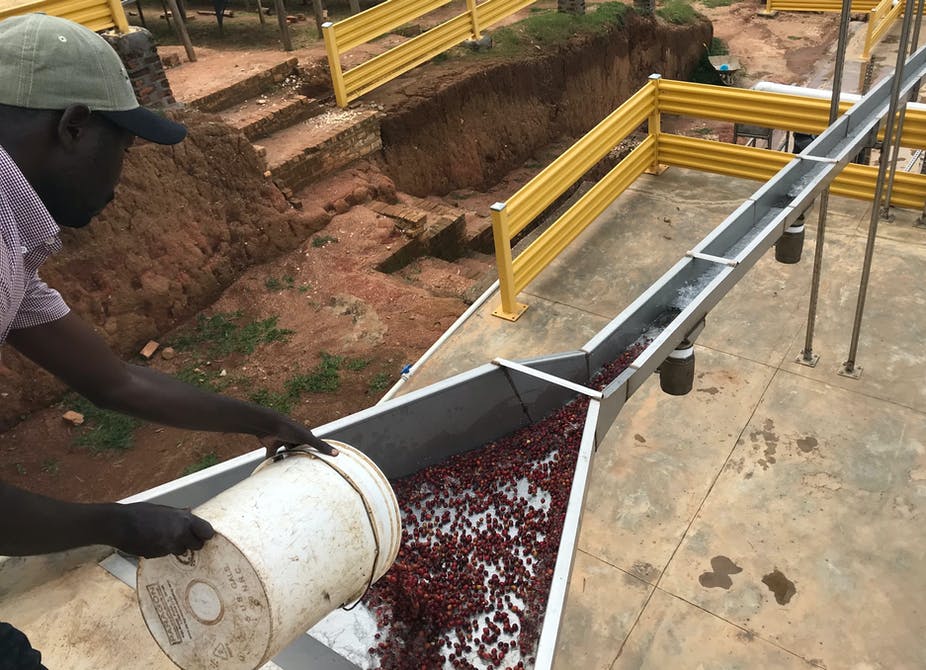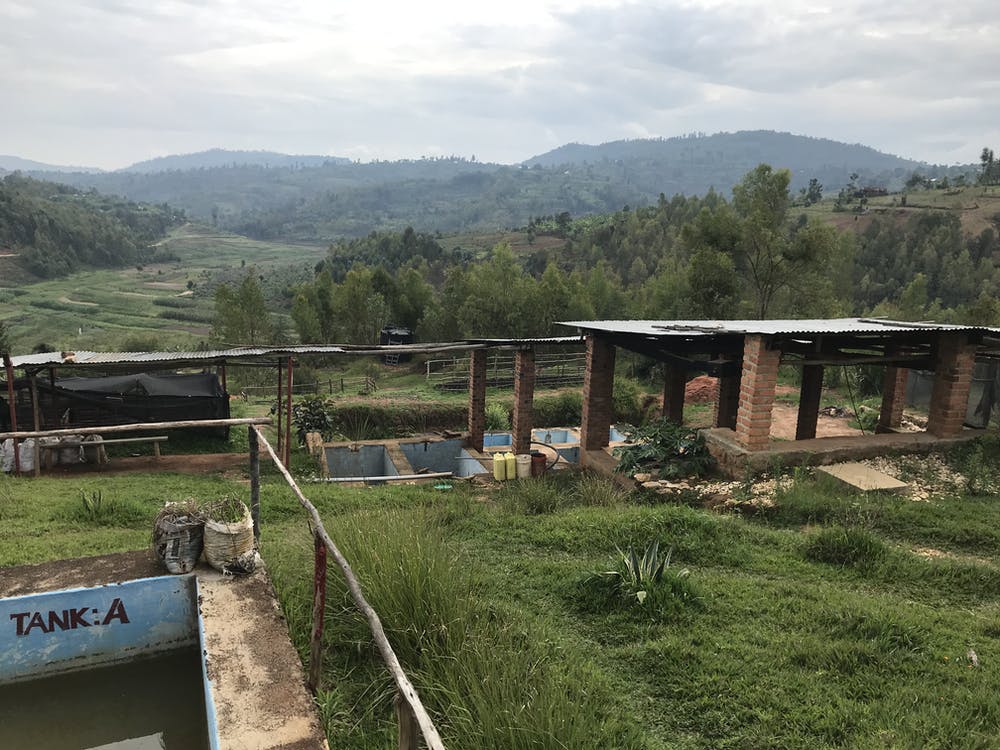
Fresh coffee being milled in Rwanda. Andrew Gerard, CC BY-SA 4.0.
As countries begin to reopen after months of coronavirus lockdown, Rwanda is pressing on with its May coffee harvest.
Rwanda, which supplied 21,000 tons of coffee to the global market in 2019, is about the world’s 30th top coffee supplier. It is known, proudly, for the quality of its beans, not the quantity.
After two decades of targeted investment by industry leaders, Rwandan coffee – once sold primarily in supermarket blends – is now available at Starbucks and upscale cafes alike.
But with coffee shops closing worldwide, the coronavirus crisis is testing Rwanda’s top export.
COVID-19 and coffee in Rwanda
Rwanda appears to have been successful in keeping COVID-19 at bay so far. The Central/Eastern African country of 12 million reported just over 250 cases as of early May.
In March the government locked down the capital of Kigali, halted commercial flights and banned domestic travel for all nonessential workers. Coffee production, which provides an income to 350,000 Rwandan farming families, has been allowed to continue – in modified fashion.
To analyze the effects of COVID-19 restrictions on Rwanda’s coffee industry, we drew on information from our five-year research project funded by the U.S. Agency for International Development and interviewed local collaborators and international industry experts.
As a critical sector of the Rwandan economy, coffee is a sensitive topic in the country, so our contacts in Rwanda preferred to speak anonymously. The quotes included here are drawn from our interview notes and their accuracy checked with our sources.
Our analysis finds that health restrictions are increasing coffee production costs in Rwanda and introducing delays to the global supply chain that consumers halfway across the world may eventually feel.
Open but restricted
Rwandan coffee farmers must adhere to social distancing guidelines during the May harvest, keeping coffee pickers one meter apart. As a result, according to two Rwandan coffee sector experts who work with farmers, they are hiring fewer workers. That may increase the time it takes to pick the same acreage.
Since not all workers in the coffee sector are considered essential, Rwanda’s strict travel restrictions are also slowing coffee’s journey from farm to cup.
“I cannot even legally drive out to our roastery, even though it is just a few kilometers away,” the manager of one Rwandan coffee roasting facility told us.
To avoid contact between buyers and farmers, some processing mills – which prepare fresh coffee beans, or “cherries,” for export and roasting by removing the skin and pulp – are asking farmers to deliver their harvest themselves, rather than send trucks for pickup.
Few farmers in Rwanda own cars or motorcycles – less than 3%, based on our research. So they must deliver their coffee on foot, traveling on average 3.5 miles. A round trip that normally takes minutes may now take two hours.
Once the coffee reaches the mill, hurdles to processing arise.
“My company has two agents who are allowed to travel to mills to oversee operations, but they must be tested for COVID-19” at police checkpoints when entering a new district, a Rwandan coffee buyer told us.
Sorting and milling of coffee is also likely to take substantially longer due to decreased staffing in compliance with social distancing regulations.
To keep on-site workers safe, mills are setting up hand washing stations and distributing hand sanitizer, but many are struggling to get required protective equipment like face masks, which have surged in price due to increased demand.

Vista of Rwandan coffee country. Andrew Gerard, CC BY-SA 4.0.
Global production disruptions
Sucafina, a multinational coffee trading company, reports similar supply chain disruptions in coffee-producing countries worldwide.
Colombia, the top supplier of coffee to the U.S., is under a strict national quarantine. There, coffee farmers report difficulty picking, packaging, delivering and selling their harvest.
“We are preventing the economic activity that can reactivate the economy of coffee-producing regions,” warned Roberto Vélez Vallejo of Colombia’s National Federation of Coffee Growers – which sells coffee under the brand Juan Valdez – via Tweet.
To overcome such challenges, Rwanda’s coffee farmers are turning to mobile technology.
Despite pervasive poverty, many Rwandan coffee farmers own mobile phones, and the country has worked hard to build a robust mobile network even in rural areas. That’s a critical resource right now, since the Rwandan government has mandated that payments between coffee mills and farmers be cashless.
Rwandan coffee farmers are also benefiting from being highly organized. The country has many agricultural cooperatives, which in normal times meet in person, provide direct services and help farmers negotiate collectively with buyers.
Now, co-op leaders are using text messaging to share information about coffee prices, social distancing protocols and other coronavirus-related topics with members.
Shifting demand
Neither technology nor unions can solve what is perhaps the biggest problem facing Rwandan coffee’s industry: a global coffee market in upheaval.
Across the United States and Europe – which together import over 60% of the world’s coffee – COVID-19 containment measures have shut down cafes, shifting where demand is located.
In the U.S., which has a US$47.5 billion coffee shop industry, about a quarter of coffee consumption normally takes place away from home. Recently, this figure has come close to zero.
To serve coffee drinkers stuck at home, roasters must pivot to online and grocery sales – a difficult transition, especially for small players competing with chains like Starbucks.
International uncertainty is trickling down to Rwandan farmers in the form of broken contracts. One major Rwandan coffee exporter told us several buyers had either reduced or delayed finalizing their planned purchases.
Ruth Church, of the U.S.-based Artisan Coffee Importers, which specializes in Rwandan coffee, said she worried her clients would reduce orders too, but has since gotten confirmation that they will maintain last year’s purchasing levels.
“That comes from the relationship they’ve been able to form with the farmer,” she said of her buyers. “They know producers are vulnerable.”
But, Church warned, “Others may be forced to cancel or reduce.”
Rwandan coffee is adapting to get coffee to market. Now they hope someone will buy it.
Bridget Vuguziga, an independent consultant based in Kigali, Rwanda, contributed to this analysis.
This article is republished from The Conversation under a Creative Commons license. Read the original article.
Disclosure statement: Andrew Gerard and David L. Ortega have both received funding from the United States Agency for International Development.
Andrew Gerard and David L. Ortega
Andrew Gerard: Research Assistant, Department of Community Sustainability, Michigan State University. David L. Ortega: Associate Professor of Food and Agricultural Economics, Michigan State University.






Comment